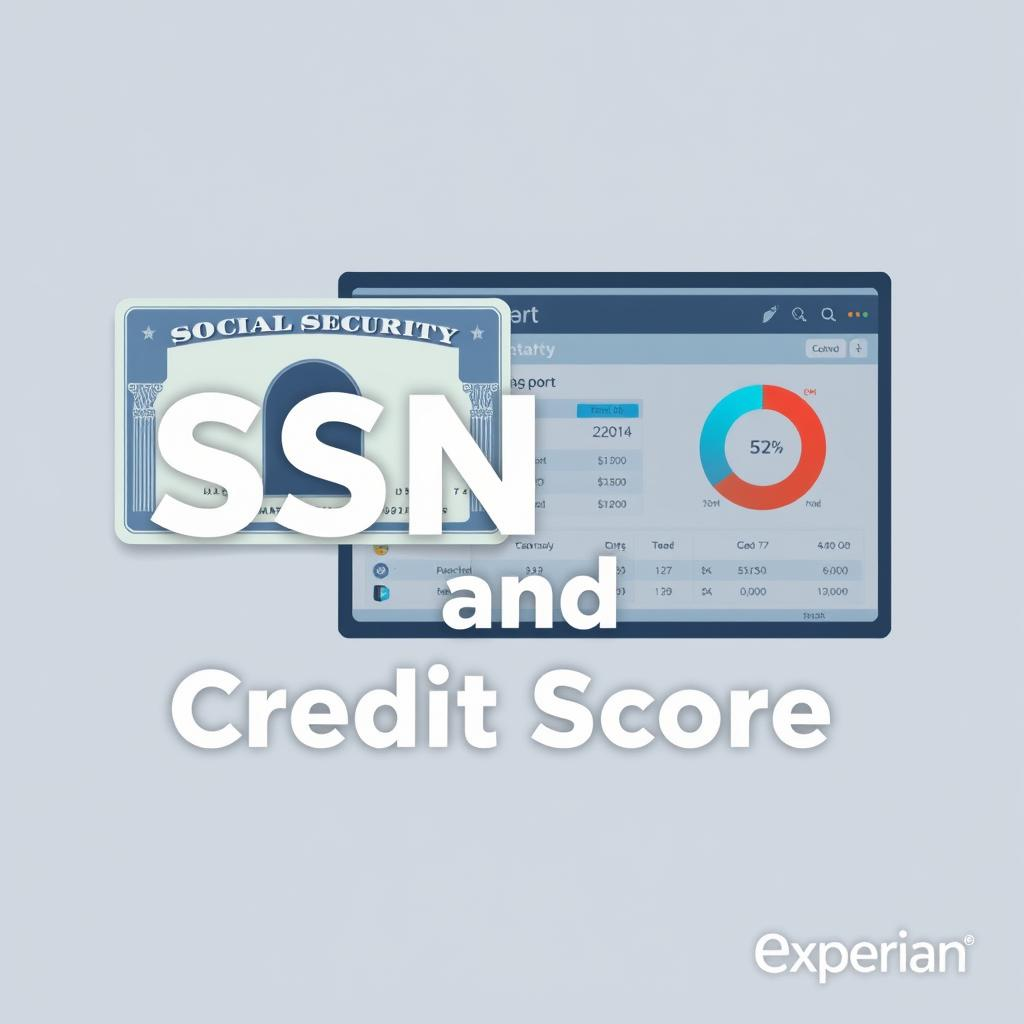Your Social Security Number (SSN) is much more than just an identifier—it’s the key that unlocks your financial history. Every time you apply for a loan, open a bank account, or even rent a home, your SSN is used to pull up your credit report and assess your creditworthiness. In this comprehensive guide, we dive deep into the link between your SSN and your credit score, explaining how they’re connected, the factors that affect your credit history, and what steps you can take to protect and improve your financial identity. Whether you’re new to credit or looking to repair your score, understanding this connection is essential for making informed financial decisions.

Table of Contents
What is a Social Security Number (SSN)?
A Social Security Number (SSN) is a unique nine-digit number issued to U.S. citizens, permanent residents, and temporary (working) residents. It is managed by the Social Security Administration (SSA) and is primarily used to track individuals for Social Security purposes. However, its role extends far beyond that.
Key Uses of an SSN:
- Employment & Tax Reporting: Employers use your SSN to report your income and withhold taxes.
- Credit & Banking: Lenders and financial institutions use your SSN to pull your credit history and establish your creditworthiness.
- Government Services: Your SSN is used to determine eligibility for benefits, such as retirement and disability.
For a detailed explanation of SSNs, check out the Wikipedia page on Social Security Numbers.
The Basics of Credit Scores
A credit score is a numerical expression based on a level analysis of a person’s credit files, representing the creditworthiness of an individual. Credit scores are calculated by credit bureaus like Experian, Equifax, and TransUnion.
Major Factors Affecting Credit Scores:
- Payment History (35%): Your record of on-time payments.
- Credit Utilization (30%): The ratio of your credit card balances to your credit limits.
- Length of Credit History (15%): How long your accounts have been open.
- New Credit (10%): The number of recently opened accounts and inquiries.
- Credit Mix (10%): The variety of credit products you have.
Although your SSN itself does not directly change your credit score, it is the identifier that links all your credit information together.
How Your SSN Connects to Your Credit Score
Your SSN is essentially the “glue” that holds your credit history together. Here’s how they are linked:
1. Compilation of Credit History
Credit bureaus use your SSN to compile data from various lenders. Every time you open an account—whether it’s a credit card, a loan, or even a utility account—the lender reports this activity using your SSN. This builds your credit history, which forms the basis of your credit score.
2. Identity Verification
Since the SSN is a unique identifier, it helps ensure that your credit information is correctly matched to you. However, if there’s an error (for example, a typo or fraud), your credit report could be negatively affected. That’s why maintaining the accuracy of your SSN in all records is critical.
3. Fraud Detection and Identity Theft
If someone fraudulently uses your SSN, they can open accounts in your name, which may lower your credit score over time. It’s essential to monitor your credit report regularly for any signs of identity theft.
For more on the role of SSN in credit reports, visit the Annual Credit Report website.
How Does Your SSN Impact Your Credit Report?
While the SSN itself does not influence the numerical value of your credit score, it plays an indirect role through the following mechanisms:
Accurate Record Matching
- Credit Reporting: All credit activities reported by lenders are associated with your SSN, ensuring that your credit report reflects your true financial behavior.
- Error Resolution: If your SSN is recorded incorrectly, or if there’s a mix-up with someone else’s information (a common issue known as a mixed credit file), your credit report might show errors that could affect your score.
Identity Verification and Security
- Preventing Fraud: Regular monitoring of your SSN-linked credit report can alert you to unauthorized activities. Experian’s identity theft protection services provide tools for early detection.
- Credit Repair: If errors are detected, you can dispute them with the credit bureaus. Keeping your SSN information updated is a key step in the credit repair process.
Protecting Your SSN and Credit Score
Maintaining the integrity of your SSN is vital for protecting your credit score. Consider the following best practices:
Tips to Safeguard Your SSN:
- Limit Sharing: Only provide your SSN when absolutely necessary.
- Secure Documents: Keep your Social Security card and related documents in a safe place.
- Monitor Your Credit: Regularly check your credit reports from Equifax, Experian, and TransUnion for any discrepancies.
- Shred Sensitive Documents: Dispose of documents containing your SSN securely.
- Identity Theft Protection: Consider enrolling in a credit monitoring service. For example, several reputable services offer comprehensive identity theft protection solutions.
Steps to Improve and Monitor Your Credit Score
Improving your credit score involves a combination of sound financial practices and regular monitoring. Here’s a step-by-step guide:
- Review Your Credit Reports:
- Request a free annual credit report from AnnualCreditReport.com.
- Check for inaccuracies or unauthorized activities.
- Dispute Errors Promptly:
- If you notice mistakes (such as mixed credit files or incorrect SSN entries), file disputes with the credit bureaus. Detailed instructions are available on the Equifax Dispute Center.
- Pay Bills on Time:
- Set up automatic payments to avoid missing due dates, which is crucial as payment history accounts for 35% of your credit score.
- Reduce Credit Utilization:
- Aim to keep your credit utilization ratio below 30%. For example, if your credit card has a $1,000 limit, try not to carry a balance higher than $300.
- Maintain a Healthy Credit Mix:
- Diversify your credit portfolio by managing different types of credit responsibly.
- Regularly Monitor Your Credit:
- Use free or subscription-based credit monitoring services to receive alerts about changes in your credit report.
Following these steps not only helps improve your score but also protects you from potential identity theft.
Common Misconceptions about SSN and Credit Scores
There are several myths surrounding SSNs and credit scores. Let’s debunk a few:
- Myth 1: Changing your SSN will reset your credit score.
Fact: Even if you change your SSN due to identity theft or other valid reasons, credit bureaus will link your new number to your existing credit history. However, new credit applications may initially show no history until the link is fully established. - Myth 2: A low credit score means you must have a bad SSN.
Fact: The SSN is merely an identifier. Your credit score reflects your financial behavior—such as payment history and credit utilization—not the number itself. - Myth 3: You should share your SSN freely to build credit faster.
Fact: Sharing your SSN unnecessarily increases the risk of identity theft. Only provide it to reputable institutions when required.
Key Factors Affecting Your Credit Score: A Quick Table
| Factor | Importance | Notes |
|---|---|---|
| Payment History | 35% | Timely payments build a strong credit history. |
| Credit Utilization | 30% | Keep below 30% to maintain a healthy score. |
| Length of Credit History | 15% | Longer history generally means better reliability. |
| New Credit Inquiries | 10% | Too many inquiries can lower your score. |
| Credit Mix | 10% | A diverse range of accounts is favorable. |
Note: Although your SSN is not a factor in these calculations, it is the identifier that links all these components together in your credit report.
Related Topics for Broader Financial Awareness
For those interested in exploring more topics related to financial identity and security, consider visiting:
- Ever Noticed Your SSN is Off? Here’s How to Correct Those Costly Mistakes!”
Frequently Asked Questions (FAQ)
Q1: How exactly does my SSN affect my credit score?
A1: Your SSN is used by credit bureaus to compile your credit history. It links all your financial activities—such as loans, credit card usage, and payments—to create your credit report. Any errors or fraud associated with your SSN can indirectly affect your score.
Q2: If my SSN is compromised, will it lower my credit score immediately?
A2: Not directly. However, if someone uses your SSN to open fraudulent accounts, those activities can negatively impact your credit report and lower your score over time. Regular monitoring is crucial.
Q3: Can I change my SSN to improve my credit score?
A3: Changing your SSN due to fraud or identity theft is possible, but it won’t “reset” your credit history. The new number will eventually be linked to your past financial activities, and a temporary gap in credit history might occur.
Q4: What steps can I take to protect my SSN and credit score?
A4: Limit sharing your SSN, secure important documents, regularly monitor your credit reports, and consider enrolling in identity theft protection services. Dispute any inaccuracies immediately with the credit bureaus.
Q5: How can I dispute an error on my credit report related to my SSN?
A5: Visit the dispute section on the websites of Equifax, Experian, or TransUnion and follow the instructions provided. Always include supporting documentation and your SSN for verification.
Conclusion
Your Social Security Number is far more than just a nine-digit number—it’s the cornerstone of your financial identity. By linking your credit history to your SSN, credit bureaus are able to create a comprehensive profile of your financial behavior, which then determines your credit score. While the SSN itself does not directly impact your score, any errors or fraudulent activities associated with it can have significant consequences.
Staying proactive by monitoring your credit reports, safeguarding your SSN, and understanding the factors that affect your credit score will empower you to take control of your financial future. Whether you’re just starting out or working to repair past mistakes, the key is to stay informed and act quickly to resolve any discrepancies.
Disclaimer
The information in this article is provided for general informational purposes only and does not constitute financial, legal, or professional advice. Always consult with a qualified professional for advice regarding your specific financial situation.
Affiliate Disclosure
Some links in this article are affiliate links, which means we may earn a commission if you make a purchase through these links—at no additional cost to you. We only recommend products and services that we trust.






